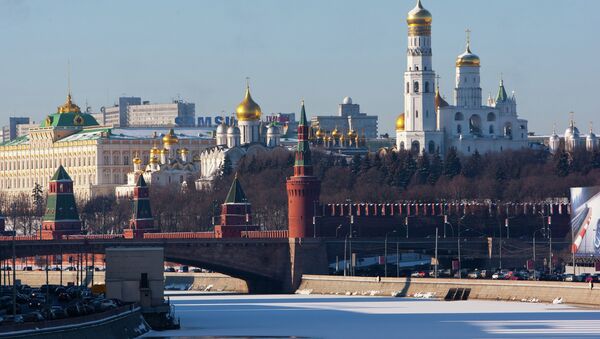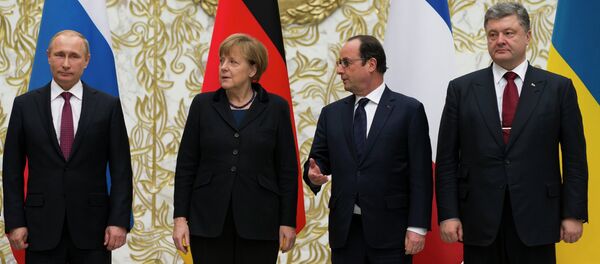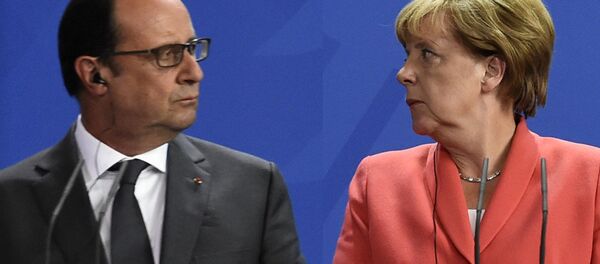For a long period of time the European Union has exerted a strong gravitational pull on Eastern European countries, German commentator Frank Nienhuysen notes, adding that recently the situation has drastically changed.
According to Nienhuysen, a hidden shift of forces is taking place in this part of Europe.
"Up until now the European Union has been a sort of political vacuum cleaner in Eastern Europe. It absorbed the states one by one, it was that powerful," the German journalist writes in his article for The Süddeutsche Zeitung.
"However, Russia is again gaining ground in its competition with the EU," he underscores.
Russia is bolstering its relations with the Balkan countries, Nienhuysen points out, referring to Russia's ambitious energy projects in the region and the Slavic Brotherhood-2016 military drills which brought together Serbian, Belarusian and Russian military units this autumn.
The Serbian Army also held the BARS-2016 tactical flight exercise together with their Russian counterparts this October.
The German journalist has also expressed his deep concerns about the outcome of the Bulgarian and Moldovan presidential elections which resulted in victory for two pro-Russian candidates.
"In Bulgaria, a Socialist who was campaigning for the abolishment of EU sanctions against Russia wins the presidency. In the Republic of Moldova, the new head of state is pushing for a more radical change: to shift away from the EU and turn to the Eurasian Economic Union, an alliance of former Soviet republics," Nienhuysen emphasizes, warning that "Moscow's influence in Europe is growing."
Speaking to Sputnik, Bogdan Bezpalko, deputy head of the Center for Ukrainian Studies at the Moscow State University, suggested that the Eastern European states have become disenchanted with the ideology of "Euro-integration," that has transformed into a "sort of religion." Instead, they want to resume normal and pragmatic relations with their neighbors, the analyst stressed.
For his part, Russian parliamentarian Franz Klintsevich underscored that the EU sanctions policy against Russia has backfired at Eastern Europe, adding to its dissatisfaction with Brussels.
Alexander Safonov of the Institute of Slavic Studies at the Russian Academy of Sciences (RAS) echoes Klintsevich.
"Bulgaria has suffered great economic losses from sanctions," Safonov told Sputnik, "For [Bulgaria] Russia has always been an important trading partner and a partner that helped [Bulgaria] to solve a number of regional issues."
Needless to say, Moscow has welcomed calls for closer cooperation made by the winners of presidential elections in Bulgaria and Moldova.
"We were impressed by some of the statements, which show the willingness to work on normalizing relations with other countries, including our own," the Kremlin spokesman Dmitry Peskov emphasized.
The crux of the matter is that the political establishment of the EU and US is openly Russophobic, Klintsevich noted in an interview with Sputnik.
He cited the recent statement made by Federica Mogherini, the current High Representative of the European Union for Foreign Affairs and Security Policy, following Donald Trump's victory in the US.
Mogherini highlighted that the EU's "very principled position" on anti-Russian sanctions was not going to change "regardless of possible shifts in others' policies."
According to the Russian parliamentarian, it is a "worrying" signal.
Klintsevich hinted at the possibility that those EU politicians who bet on anti-Russia rhetoric ahead of 2017 presidential and parliamentary elections in Europe may eventually face the same outcome as Hillary Clinton.
Ordinary Europeans are suffering from the EU's anti-Russian policies, he underscored.
"The rhetoric of threats and diktat toward Russia is unacceptable, and life has shown that the EU and the United States have not solved that problem," Klintsevich stressed.




